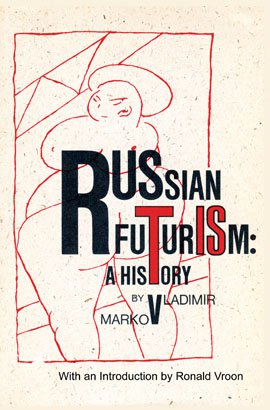
About the Author
Vladimir Markov is Professor Emeritus in the Department of Slavic Languages and Literatures at the University of California, Los Angeles, where he taught for thirty years. His first book, The Longer Poems of Velimir Xlebnikov, established him as a major specialist on the Russian avant-garde. His publications include Russian Imagism, 1919-1924, and the two-volume Kommentar zu den Dichtungen von Konstantin Bal’mont. He edited major poetic anthologies and works by Russian modernists. He also wrote scores of articles on Russian lyric poetry from the eighteenth to the twentieth century, and several volumes of his own verse.
Russian Futurism: A History
Vladimir MarkovNew Academia Publishing, 2006
520 Pages
ISBN 0-9777908-0-0 Paperback
For BULK ORDERS, order directly from New Academia Publishing.
Queries: orders@newacademia.com
About the Author
Vladimir Markov is Professor Emeritus in the Department of Slavic Languages and Literatures at the University of California, Los Angeles, where he taught for thirty years. His first book, The Longer Poems of Velimir Xlebnikov, established him as a major specialist on the Russian avant-garde. His publications include Russian Imagism, 1919-1924, and the two-volume Kommentar zu den Dichtungen von Konstantin Bal’mont. He edited major poetic anthologies and works by Russian modernists. He also wrote scores of articles on Russian lyric poetry from the eighteenth to the twentieth century, and several volumes of his own verse.
About the book
This is the second edition of Russian Futurism: A History that first appeared some forty years ago. It was a major cultural event at the time and is still the most accurate and comprehensive English-language directory to the literature of the Russian avant-garde. Markov gives an exhaustive, factual description of the movement, avoiding analyses, definitions, and general judgments. Rather, he presents a chronological accumulation of facts, mostly dealing with books, so the approach is similar to taking books from a shelf, one after another, and trying to tell what they are about. People and groups are presented in the process of their growth and development, so that readers feel that they are enveloped by, and have lived through, the whole movement.The English translations of most of the Futurist writings presented in this study are to be found in Words in Revolution (Lawton and Eagle, eds./trs. New Academia Publishing 2005).
Praise
“The publication of Russian Futurism: A History almost forty years ago was a major cultural event. That the book is still the most accurate and comprehensive English-language directory to the literature of the Russian avant-garde testifies to the richness and prescience of Vladimir Markov’s scholarship.”
– John Bowlt, Professor of Slavic Languages and Literatures, University of Southern California; Director, Institute of Modern Russian Culture, Los Angeles.
“Forty years after its original publication, Vladimir Markov’s Russian Futurism: A History remains the classic in its field. Its learned account of Russian avant-garde poetics with respect to various forms and genres—poems, plays, artist’s books, manifestos—is still the first I turn to when I want to review the critical information about Futurist manifestos or Khlebnikov’s long poems and stories, or the collaborations of Goncharova and Kruchenykh. Meticulous and thorough, Markov’s book, in this new edition, will be indispensable for students of the avant-garde.”
– Marjorie Perloff, Sadie D. Patek Professor Emerita of Humanities, Stanford University, Scholar-in-Residence, University of Southern California, author of The Futurist Moment.
“It is wonderful to have this classic study of Russian Futurism and related movements back in print. Everyone who studies Russian modernism and the avant-garde has used and benefited from it. If any single book can be called ‘indispensable’ for the study of a period, it is Markov’s, and now further generations can have it at hand. It is a book to give the lie to the Futurist épatage ‘read this book and destroy!’ Keep forever!”
– John Malmstad, Samuel Hazzard Cross Professor of Slavic Languages and Literatures, Harvard University.





 Coming Soon
Coming Soon Awards
Awards